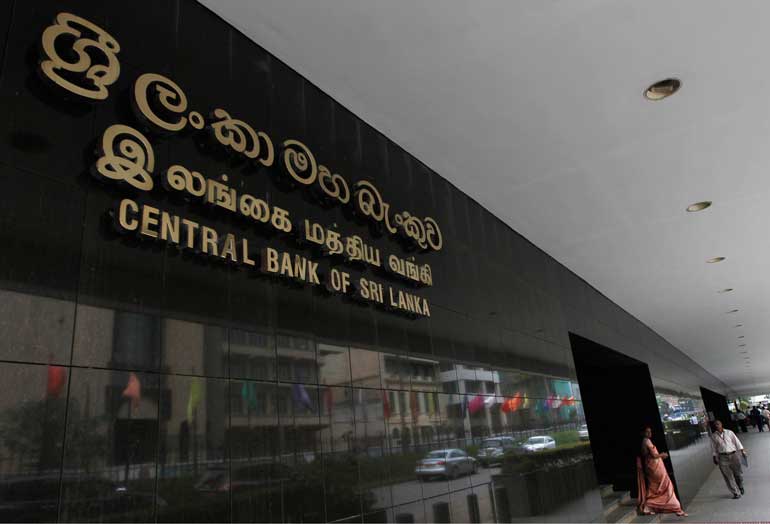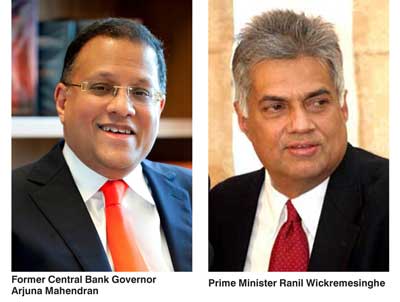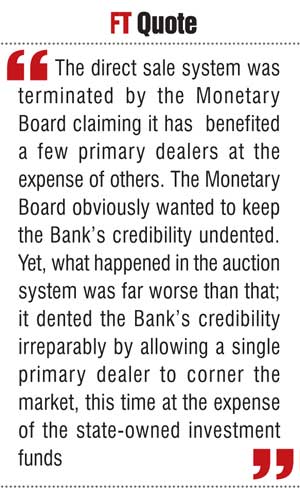Friday Feb 20, 2026
Friday Feb 20, 2026
Monday, 11 July 2016 00:00 - - {{hitsCtrl.values.hits}}
 The demonised direct sales of Treasury bonds
The demonised direct sales of Treasury bonds
The Central Bank has been telling the public again and again since March 2015 that the sale of government securities directly to  primary dealers is faulty. According to the Bank, the system helps only a select crowd of primary dealers. Since the sales are made through telephone conversations and not through public auctions, the Bank further charges that the system lacks transparency.
primary dealers is faulty. According to the Bank, the system helps only a select crowd of primary dealers. Since the sales are made through telephone conversations and not through public auctions, the Bank further charges that the system lacks transparency.
If it is not transparent, it further argues, that it is fraught with room for abuse, malpractices and corruption. Since the prices are determined by officials of the Public Debt Department at their discretion, it also impedes, says the Bank, market development.
This is contrary to the primary requirement of market efficiency for which prices should be determined by market forces. Hence, the Bank has labelled the direct sale system a ‘demon’. It is a demon, it has to be annihilated at any cost.
The belated demonstration of wisdom
This is obviously good wisdom on the part of the Bank. Since the Bank has no legal existence and is owned by the Monetary Board, it is demonstrative of the wisdom of the Board as well. However, the Board thought of demonstrating that wisdom only after it was accused of being a party to a massive Treasury bond scam.
The first bond scam
In this bond scam, the Bank had offered Rs. 1 billion worth of 30-year Treasury bonds carrying a fixed interest rate of 12.5% to the  market but ended up selling bonds to a value of Rs. 10 billion. This was 10 times the original offer.
market but ended up selling bonds to a value of Rs. 10 billion. This was 10 times the original offer.
Under normal circumstances, the Bank would have accepted up to 2 to 3 times of the original offer and not more than that. Hence, the market was not ready for such a jumbo issue. Then, it was revealed that a half of the jumbo issue amounting to Rs. 5 billion had been issued to a Primary Dealer company belonging to the son-in-law of the incumbent Governor of the Bank.
However, this issue had been done to this primary dealer at a price of around Rs. 91 per Rs. 100 bond whereas the prevailing market price of a bond of those attributes was as high as Rs. 120. The particular primary dealer company had bid Rs. 2 billion on its own and a further Rs. 13 billion through another primary dealer, Bank of Ceylon, at around the same prices.
All these had happened during the last half an hour before the closing of the auction arousing suspicion that this primary dealer company had got some inside information about the possible jumbo issue of Treasury bonds. Thus, had the Bank accepted the entirety of the Rs. 20 billion at the auction as had been instructed by the Governor, this primary dealer company would have ended up with Rs. 15 billion or 75% of the total issue. Since it would have got the bonds at around Rs. 91 per bond, it would have made a market killing out of the bond issue given its existing price of around Rs. 120 per bond.
Crying foul by market participants
When the other market participants started crying foul, the Bank immediately justified its action on the grounds that the Government had an urgent cash requirement of around Rs. 20 billion to pay out to the contractors.
When it was pointed out that the Bank could have accepted up to about Rs 2.5 billion from the auction in question without disturbing the interest rates and obtain the balance through a direct sale, the Bank announced for the first time that it had decided to abolish the direct sale system.
It was later revealed, however, that just three days before the scandalous bond auction, the Monetary Board had decided, going by a paper submitted by the Public Debt Department, to issue Treasury bonds in a combination of both auctions and direct sales. When this piece of information became public, it was further revealed that the Governor had regularised his decision by informing the Board of the termination of the direct sale system. But that had been done one week after the controversial bond issue. Thus, procedurally, the Board is yet to approve of it formally.
 A passive Board nodding its head to an ex-post termination
A passive Board nodding its head to an ex-post termination
The termination of the direct sale system was, therefore, a reversal of the earlier decision of the Board. A Board conscious of its duties and responsibilities would not have accepted such a reversal without getting into a serious discussion of the rationale and subsequent implications of its abrupt termination.
This reminds of the categorisation of a bad economist against a good economist by the 19th Century French economist, Frederic Bastiat in 1850. Bastiat said that a bad economist would see only what can be seen whereas as a good economist will see not only what is seen but also what is foreseen. The Monetary Board which is supposed to be the economic advisor to the Government thus degenerated itself to the status of a bad economist.
A defensive Board becoming offensive
The Board did not stop at that. During the next 15 months, the Board continued to defend tooth and nail its decision arrived at without any serious analysis. It will continue to do so in the future too under the reign of the new Governor unless he is careful not to fall into the trap.
Terming direct sales as ‘private placements’ which connoted a bad taste, it even got the Prime Minister Ranil Wickremasinghe to justify its decision in Parliament denouncing the so-called direct sales.
Said the Prime Minister: “Private placements were usually as large as ten times bigger than the amount of Government bonds sold through the auctions. This led to an unhealthy link between some of the officers of the Central Bank’s Public Debt Department, Primary Dealers and large Corporations who benefited from such private placements. This practice only enriched a handful of cronies of the previous Government.” (available at: https://www.colombotelegraph.com/index.php/treasury-bonds-investigation-pm-ranil-wickremesinghes-full-speech-today/).
The demonised direct sales had in fact been beneficial
The Prime Minister further said:“Records confirm that private placements had become a norm rather than an exception. In just one instance in 2013, Rs. 16 billion worth of five-year bonds were sold through auction at a yield of 10.9% and thereafter Rs. 76 billion of the same bond were sold through private placements at a higher yield of 11.42%. Who stood to benefit from such acts? The answer is obvious.”
It appears that the Prime Minister has been informed by the Monetary Board that it was a crime to issue five-year bonds in 2013 at 11.42% through direct sales. What the Prime Minister has not been informed about by the Board is that the prevailing market rate for 8.0% - five-year bond in January 2013 was much higher at 11.63% and 11.45% in March 2013.
Hence, if the bonds had been sold at 11.42% under direct sales it would have been at a beneficial rate for the Government since the bonds in question had been sold above the prevailing market prices. Those who had bought the bonds at those prices could not have made a profit immediately as alleged by the Prime Minister since the bond prices remained at around the same low levels almost throughout the year. It is not comprehensible why the Monetary Board, the objective, impartial and impassioned advisor to the Government, chose to supply only partial information to the Prime Minister.
Public Debt officials defend direct sales
According to the Lawyers’ Committee (also known as the Gamini Pitipana Committee) appointed by the Prime Minister as he pledged in Parliament, the officials of the Public Debt Department of the Central Bank have defended the direct sales system now christened as the private placement system.
The officials had said that if the department announces the full amount of fund requirement of the Government, the primary dealers would submit bids at “competitively higher interest rates” (p 3). Hence, reports the Committee: “Therefore, the PDD announces a bond which is lesser than the actual fund requirement of the Government and usually accepts around two to two and a half times more than the value of the bond auctioned. Thereafter, the PDD was planning to call for Direct Placement (private placement) to satisfy the balance requirement of Government funding.” (p 3).
Hence, the Committee further reports that the officials were of the view that the private placement was a “healthy mechanism”. However, the Committee has reported that Deputy Governor P. Samarasiri, who was functioning as the Senior Deputy Governor or CEO of the Bank, and Governor Arjuna Mahendran had differed from this expert view of the officials of the Public Debt Department. They had objected to it on the grounds of a lack of transparency in the private placement system which had been echoed by primary dealers who had been interviewed by the Committee on the issue.
Hence, it appears that the decision to terminate the direct sales system had been taken by Governor Mahendran without proper investigation or consultation with the staff at the Public Debt Department. The Monetary Board too had blindly accepted this decision when it was informed of it one week after its termination.
Monetary Board’s misinformation campaign
The Monetary Board has misinformed not only the Prime Minister but also the general public on the issue of direct sales. In a statement which it issued in June 2016 in response to the critique of this writer it has once again provided incorrect information.
Says the Board in its statement: “Wijewardena, during his tenure as Deputy Governor, introduced the so-called private/direct placement window for issuance of government securities in 2008 by justifying it to the Monetary Board in view of circumstances of unwarranted increase in interest rates on government securities prevailing at that time.”
Direct sales were started in 1997
The system of direct placement was introduced not by this writer but in 1997 when the primary dealer system was introduced to the country during the tenure of A.S. Jayawardena as Governor. At that time, this writer was simply the Superintendent of the Employees Provident Fund and not the Deputy Governor.
However, as the largest investor in government securities on behalf of the Monetary Board, this writer recalls attending a meeting chaired by Governor Jayawardena to map out the strategy for the smooth functioning of the primary dealer system. The others who were present at the meeting were S. Easparathasan, Deputy Governor, G.M.P de Silva, Executive Director and T.S.N. Fernando, Superintendent of Public Debt.
The need for Central Bank regulation in the absence of a competitive market
It was noted at this meeting that there was the possibility of some primary dealers acting in collusion and seeking to jack up interest rates. It has to be prevented because the duty of the Central Bank is to raise money for the Government at the cheapest cost while avoiding sudden increases in interest rates.
Hence, it was decided that the Central Bank should use its discretionary power as the borrower of funds to decide on the optimal amount it could raise through auctions without causing an unwarranted increase in interest rates and getting the market participants to invest in the remaining quantum of bonds at the weighted average interest rate available at the particular auction or if all bids at that auction had been rejected, at the weighted average rate of the previous bond auction. This system would not give an undue advantage to any primary dealer since they were required to invest around the prevailing market yield curve.
When it was pointed out to Governor Jayawardena that it would be against the market, his reaction was sharp and clear. Said Governor Jayawardena: “There is no competitive market here because the licensed primary dealers are a group of oligopolists who can drive the rates to their advantage. The Central Bank, while seeking market development in the long run, has a right to prevent a situation that would lead to unfair trade practices by a few primary dealers who might have access to inside information. Hence, market development means market taming too.”
History vindicates direct sale system
These direct sales, demonised by the Monetary Board just one week after it had decided to adopt it as a healthy mechanism, did not allow any primary dealer to corner the market at the expense of others.
Since the Public Debt Officials were prevented by Governor Mahendran and the Monetary Board from actively regulating the market through direct sales, what was feared by Governor Jayawardena in 1997 had in fact happened after March 2015. Governor Jayawardena, who is an ardent advocate of market development, knew very well that in actual practice there were no perfect markets; in the case of the government securities market, his reading was that it was an oligopoly controlled by a few primary dealers. If the Bank throws away an important weapon available to it to regulate the market, in this instance the direct sale system, it cannot help being preyed upon by a few predatory primary dealers who could have access to inside information.
This is the professional due diligence which is expected of the Governor and the Monetary Board of the Central Bank. The Auditor General in his report to COPE on the bond scams has remarked that he did not observe professional due diligence on the part of Governor Mahendran. Since the Governor is directed by the Monetary Board, this unsavoury remark applies to the Monetary Board members as well.
Central Bank’s credibility at a crucial level
The direct sale system was terminated by the Monetary Board claiming it has benefited a few primary dealers at the expense of others. The Monetary Board obviously wanted to keep the Bank’s credibility undented. Yet, what happened in the auction system was far worse than that; it dented the Bank’s credibility irreparably by allowing a single primary dealer to corner the market, this time at the expense of the state-owned investment funds.
This is the story of the second bond scam that shocked the market in March 2016; it is now learned that the Monetary Board could have avoided it had it been equipped with a powerful market regulatory weapon – direct sales.
The Monetary Board was just a sitting duck watching helplessly when a powerful and well-connected primary dealer hit it on the head. The Auditor General who examined the issue has reported to COPE that the Government making a bigger amount of losses due to the termination of the direct sale system cannot be ruled out.
The abrupt termination of the direct sale system without proper analysis or inquiry caused a Governor to lose his job, a Government that came to power on the promise of good governance to lose its credibility and the ruling party to opt for damage control measures that are far worse than the damage itself.Worse still, the Monetary Board, toward which every eye is turned, has to regain its lost credibility by demonstrating that it is worth its salt.
Newly-appointed Central Bank Governor Indrajith Coomaraswamy, in his inaugural address, pledged to staff at the Bank that his prime duty was to regain the financial institution’s lost credibility. If he is true to his word, he should get the Bank’s staff to reexamine the cost of the abrupt termination of the direct sales system, regulate primary dealers properly in order to prevent them from abusing the system under the umbrella of making markets and discipline his own staff, who are accused of collaborating with certain primary dealers.
(W.A. Wijewardena, a former Deputy Governor of the Central Bank of Sri Lanka, can be reached at [email protected])